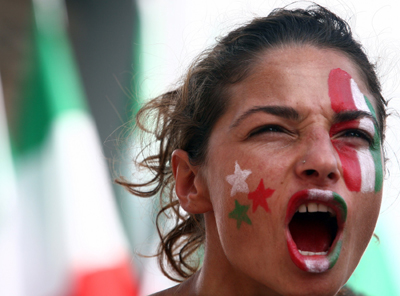Women are everywhere at this World Cup.

Italian soccer fan
celebrates at the Duomo square in
Milan.[filephoto]
|
They crowd stadiums and
street festivals, rearrange their lives around game schedules. Germany's female
chancellor is leading the cheers from the VIP section.
It's a long way from the days when soccer was strictly men's business, when
female spectators were an oddity. The German soccer federation only lifted a ban
on women in the sport in 1970. Three years later, the nation's first female TV
sports anchor was booed off the national stage by predominantly male viewers for
getting the name of a Bundesliga team wrong.
The decades-long exclusion of female fans and players bred a backslapping,
violence-prone male soccer culture that put off even more women, said
psychologist Ursula Kessels of the Freie Universitaet Berlin.
But once the dam was breached, the women came to the sport in huge numbers.
Germany's national women's team is No. 1 in the world, ahead of the United
States. The Germans won the 2003 World Cup and are six-time European champions.
A women's Bundesliga was formed in 1991.
Today, 12 percent of the 6.3 million members in Germany's soccer clubs are
women. Soccer has become the No. 1 team sport for girls.
One of the young players, 15-year-old Johanna Friebel, helped start her own
team with three close friends in the central German village of Schlangen.
She attends all home games of the nearby FC Paderborn, a second division
club.
"More and more girls are coming to watch the Paderborn games," she said. With
three girlfriends, she follows Germany's World Cup games on a large screen in
Paderborn, and the other matches at home on TV.
Niels Barnhofer, a spokesman for the national soccer federation, hopes the
World Cup, with its good-natured street celebrations, will attract even more
women.
One high-profile fan is normally subdued Chancellor Angela Merkel, who has
attended every Germany game and has been captured in TV closeups raising her
arms in joy over a goal.
Yet in an interview earlier this year with Germany's largest tabloid, she had
to prove her soccer credentials. Asked by Bildzeitung if she knew the offside
rules, she said she had expected such a question, then drew some diagrams for
the journalists, passing the test.
"You probably wouldn't have asked a male chancellor this question," she
admonished the journalists. "I'm also sure many don't know the answer."
A TV commentator wondered out loud about the absence of Merkel's husband, who
stays out of the limelight and, according to the chancellor, doesn't care much
about soccer.
Such role reversals would have been unlikely in the first two decades after
World War II, when Germany rebuilt its shattered economy, but also was steeped
in social conservatism.
Until 1970, the national soccer federation (DFB) banned female teams.
Federation chiefs argued that the sport was too aggressive for women.
During the ban, a secret soccer culture flourished, with women organizing
teams and even holding unofficial international games, said Juergen Nendza,
co-curator of an exhibit on women in soccer.